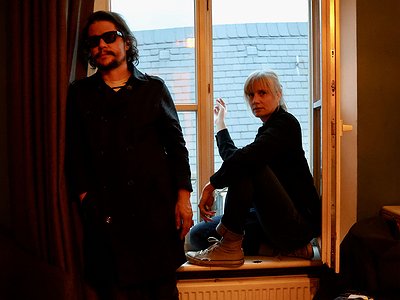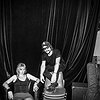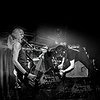Name: Peter Kernel
Members: Aris Bassetti and Barbara Lehnhoff
Interviewee: Aris Bassetti
Nationality: Swiss (Barbara), Canadian (Aris)
Current release: Peter Kernel's Drum to Death is out via On the Camper. It features collaborations with and contributions by the band's favourite drummers. Guests include Bernard Trontin (The Young Gods), Cosmic Neman (Zombie Zombie), Beatrice Graf, Domi Chansorn, Ema Matis, Tam Bor, Hugo Panzer, Julian Sartorius, Kevin Shea (Storm & Stress, Lydia Lunch), Simon Berz, and Simone Aubert (Hyperculte, Massicot). Listen to Drum to Death here and buy it on CD, or LP here.
Recommendations: Just try to focus on a few people from your family and you will discover real pieces of art. In a good or bad way.
[Read our Young Gods interview]
[Read our Young Gods interview about about Repetition, Variation, and Terry Riley's “In C”]
[Read our Julian Sartorius interview]
[Read our Simone Aubert interview]
[Read our Kevin Shea interview]
If you enjoyed this Peter Kernel interview and would like to know more about the band and their music, visit the duo's official homepage. They are also on Instagram, Facebook, and Soundcloud.
Where does the impulse to create something come from for you? What role do often-quoted sources of inspiration like dreams, other forms of art, personal relationships, politics etc play?
I think it’s of human nature to create things. We create all the time: phrases, life, plans, recipes, poo. Then some people feel the urgency to go deeper and create things that to give them a sense of reason, of presence on this planet.
We’re simplifying the topic, but we are these kind of people that really need to create in order to feel alive. We’re not good at many things. Concrete things. Adult things. We have no particular talent. So we observe and create our own world, we vomit our doubts, fears, angers, sorrows, mistakes and struggles.
For you to get started, do there need to be concrete ideas – or what some have called a 'visualisation' of the finished work? What does the balance between planning and chance look like for you?
The very first impulse is totally random. It could be something we saw, a word, a dream, a piece of art, whatever… then in a few seconds we start to visualise what we would love to “hear”.
And since we’re relatively bad musicians we need a lot of time, and effort to be able to reach what we had in mind.
Is there a preparation phase for your process? Do you require your tools to be laid out in a particular way, for example, do you need to do 'research' or create 'early versions'?
Yes, the positioning of the instruments is very important to us. Sometimes we feel the need to create but the studio is a mess, cables are everywhere and we are too lazy to plug everything in, so we lose the idea and the will to try. Lately we’ve been tryingto be more organised in order to be able to record an idea as fast as we can.
The first minutes are the most important for us. And when we write a song we usually do many versions until we find the one that works for the both of us.
Do you have certain rituals to get you into the right mindset for creating? What role do certain foods or stimulants like coffee, lighting, scents, exercise or reading poetry play?
Actually, we would love to sound like real artists having rituals and telling great stories about the moment we have a vision. But we don’t.
Probably the best riffs come to be just by chance. Those moments where one of us says “I’m going quickly to the toilet”. While waiting, the other finds something by mistake, playing the instrument the most boring way ever. Waiting.
What do you start with? And, to quote a question by the great Bruce Duffie: When you come up with a musical idea, have you created the idea or have you discovered the idea?
We start but trying to meet in the same room. Which is already not so easy.
Then we don’t know exactly what happens, but we believe that all the ideas are already there somewhere.
When do the lyrics enter the picture? Where do they come from? Do lyrics need to grow together with the music or can they emerge from a place of their own?
We usually write the music first cause we want it to work without lyrics. Then we usually add the voices as an instrument and finally the lyrics just to add details to the ‘instrumental lyrics.
What makes lyrics good in your opinion? What are your own ambitions and challenges in this regard?
I like when I listen to a sentence and think “god, I’m jealous, i wish I had writen it myself” because these are the perfect words to express what I want to say.
We always try to write lyrics that represent perfectly what we think and live that exact moment. We don’t think too much about it … if they’re good or not.
Many writers have claimed that as soon as they enter into the process, certain aspects of the narrative are out of their hands. Do you like to keep strict control or is there a sense of following things where they lead you?
For sure there’s a hidden path somewhere. We try to control a few things but at the same time we don’t really have the tools to do it. So we start walking that path without realising that it was traced by the song itself.
We think we’re controlling the process, but the result confirms that we’re really not.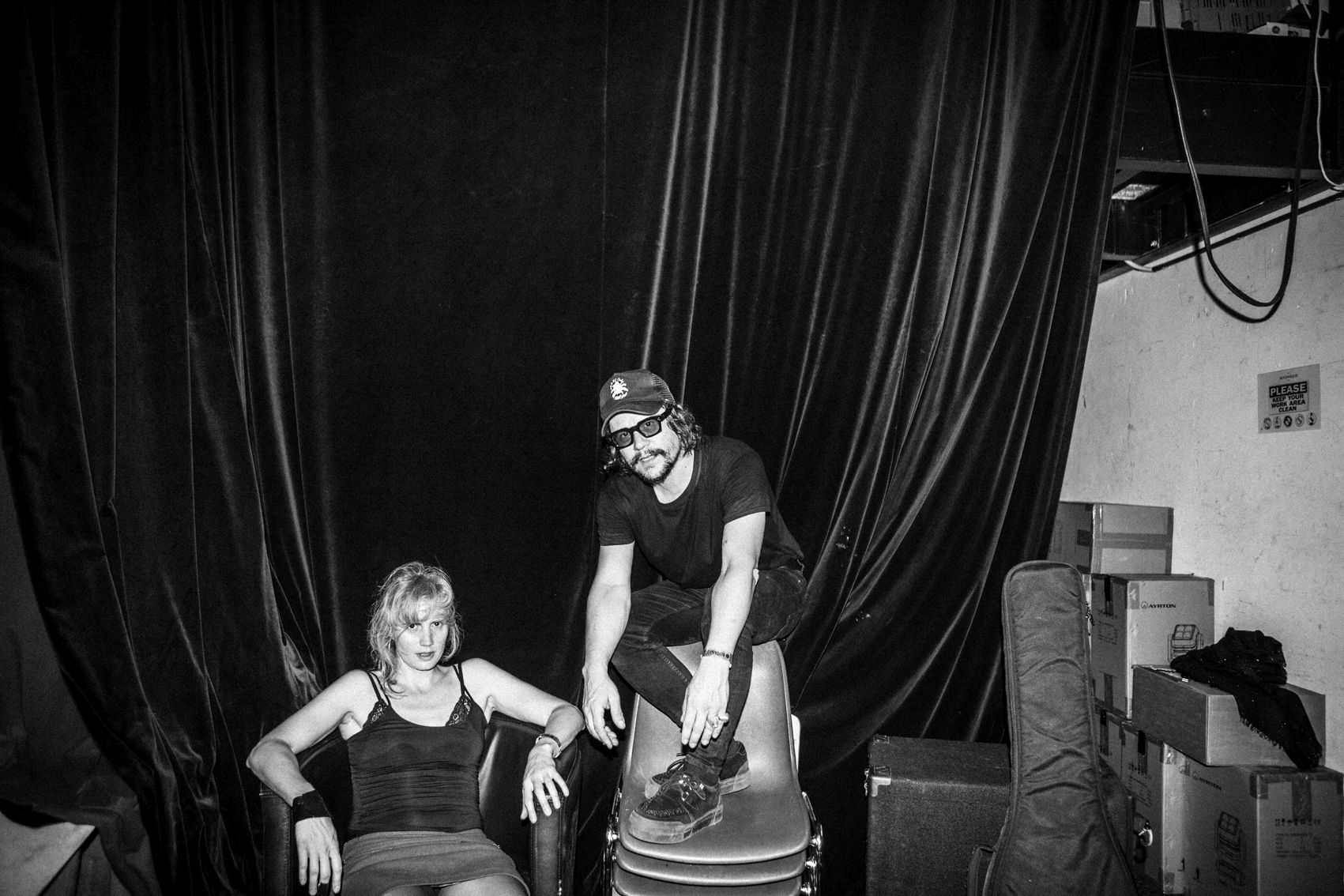
Peter Kernel Interview Image by Olivier Donnet
Often, while writing, new ideas and alternative roads will open themselves up, pulling and pushing the creator in a different direction. Does this happen to you, too, and how do you deal with it? What do you do with these ideas?
It happens a lot. Sometimes we write things that don’t fit for Peter Kernel but they do for Barbara’s solo project Camilla Sparksss, or for my solo project Mortòri.
But we also have a lot of ideas that don’t fit anything. Those are probably the good ideas.
There are many descriptions of the creative state. How would you describe it for you personally? Is there an element of spirituality to what you do?
One day, in 2023, I had the chance to sit down at a table and drink wine with Ukrainian great pianist Lubomyr Melnyk. He knows some of the music I wrote and produced and we were talking about processes and why we do music and after a while he started staring at me without speaking. After almost 2 minutes of silence he told me: “I can see your connected with infinity, keep on doing what you do”.
That phrase shocked me. First because it was an honour and second because I always thought that I do what I do just because I need to do it to exorcise things. I never really thought about it spiritually. But somewhere I think he’s right.
Perhaps I feel so out of place here, I would probably feel better somewhere else. And maybe my music helps me connect with a sort of infinity. The idea of not dying through my music.
[Read our Lubomyr Melnyk interview]
When you're in the studio to record a piece, how important is the actual performance and the moment of performing the song still in an age where so much can be “done and fixed in post?“
I think that it’s one of the most important things, the performance and the intention. To feel what you’re doing deep in your heart, bones and mind.
At the same time I admit that for some songs the process was different and we didn’t have the chance to play the entire song before recording since we play every instrument by ourselves (except for the drums), and to be able to play all the parts we record piece by piece.
But we always try to feel it when we record, even if it’s a short part.
Once a piece is finished, how important is it for you to let it lie and evaluate it later on? How much improvement and refinement do you personally allow until you're satisfied with a piece? What does this process look like in practise?
You know, our most listened song (“Men Of The Women”) was written in 10 minutes and we felt right away that it was ready.
But for some songs it took months to finish. For example (“I’ll Die Rich At Your Funeral”) we tried many different tempos, parts and we also finished the song with two totally different vocals then we left it there some weeks before deciding which one to release.
It’s important in general to let music sit and to listen to it after a few days driving in the van. This is one of our tests. Listening to the mixes, in different landscapes or places to understand if it’s a good song or not.
The last test is external feedback. For example, in 2014 we where touring with Jon Spencer Blues Explosion and one day we asked Russel to listen the the premixes of the new songs and for a song in particular (“Leaving For The Moon”) the moment we where about to push “play” we felt embarrassed. That’s not good. At all.
So we didn’t make him listen to that version, and back in the studio we rewrote the song.
Even recording a solo song is usually a collaborative process. Tell me about the importance of trust between the participants, personal relationships between musicians and engineers and the freedom to perform and try things – rather than gear, technique or “chops” - for creating a great song.
We’re not really good at collaborating. Even between us. We fight a lot. We were a couple, so our relationship is difficult; we’re now like brother and sister and we don’t have filters. So we fight until we find something that’s ok for both.
A lot of the time we throw away ideas that I loved because she thought they were shit. But we totally trust each other, even if we don’t agree on many things. She knows that sometimes I get lost in chopping mixes and complex structures, so she comes and says “stop it”. And at that point I know that I over exaggerated for sure. And sometimes she comes with a part she wants to put in the song and I don’t like it so we start fighting.
And usually after a few days I realise she was right but I never admit it. Like real brother and sister :-)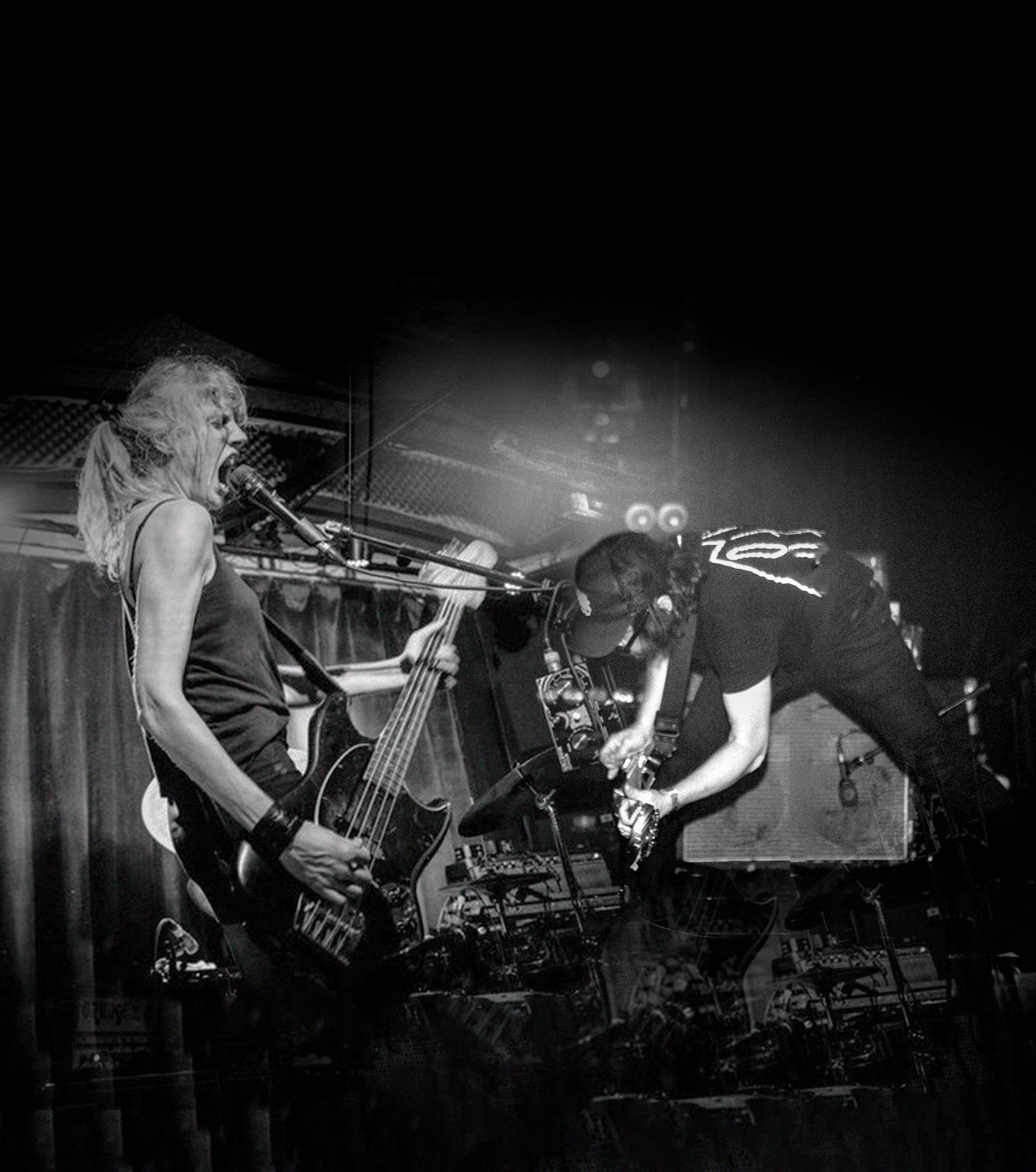
Peter Kernel Interview Image by Olivier Donnet
What's your take on the role and importance of production, including mixing and mastering for you personally? In terms of what they contribute to a song, what is the balance between the composition and the arrangement (performance)?
When we had a fix drummer in the band and our sound technician Andrea Cajelli was still alive, the mix was just the mix. The good old mix. After his death we weren’t able to go record anywhere else so we learned ourselves and discovered we where curious to experiment with the recording and premix.
So our premixes started being not so good but funny, the mix can be seen as an instrument. But for the final mix we always run them by professionals.
After finishing a piece or album and releasing something into the world, there can be a sense of emptiness. Can you relate to this – and how do you return to the state of creativity after experiencing it?
Writing music empties us. After that we feel confused.
We need some time to be able to interact with other people.
Music is a language, but like any language, it can lead to misunderstandings. In which way has your own work – or perhaps the work of artists you like or admire - been misunderstood? How do you deal with this?
It’s not really a misunderstanding, but there is a part of our music that doesn’t match with our feelings when we play it live.
Our lyrics sometimes are very personal and depressive because we wrote them in particular moments and when you sing them live in a place full of happy people that just want to have fun (as we do) it’s kinda hard.
We feel like we’re cheating with the deepest part of ourselves. This deeper version of us misunderstands our happiness and feels cheated.
Creativity can reach many different corners of our lives. Do you personally feel as though writing a piece of music is inherently different from something like making a great cup of coffee? What do you express through music that you couldn't or wouldn't in more 'mundane' tasks?
We strongly believe that creativity is not only in art. We believe that a lot of people are way more creative than “artists” because they experiment with life.
For example, Barbara’s father. He doesn’t write music, he doesn’t paint or write poems but he’s one of the greatest artists we know because he was able to reinvent himself many times in many ways.
Writing music, doing graphics, and videos and photos, we’re just the boring version of creative beings.



